#Best books on Jesus in the Old Testament
Explore tagged Tumblr posts
Text
The Golden Lion
For all that Aziraphale is the more frightened of the two of them, Crowley is the snake: he camouflages himself carefully, and his first instinct is always to flee.
Aziraphale's is to stay. He insists on facing the Apocalypse. He insists on facing the Second Coming. He insists on trying to make a difference. He doesn't want to go up to Heaven, but he does it anyway, alone, because he wants to stop the destruction of Earth (again) and keep Crowley safe.
He's very difficult to shame, too. He never gives up his innocent pleasure in eating, even though Heaven, Hell, and probably people on Earth all mock him for it. He's soft and he remains soft, even after Gabriel shames him for both his physical and metaphorical softness. That takes a lot of strength and an unshakeable character.
You know the gold ring Aziraphale wears as a badge of office, that functions as the counterpart to Crowley's snake tattoo? The charge on that ring is a lion.
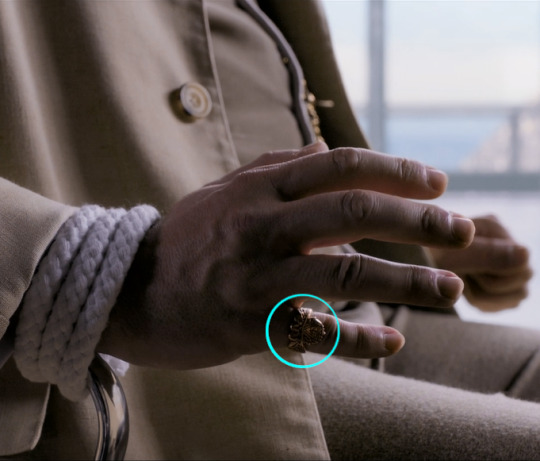
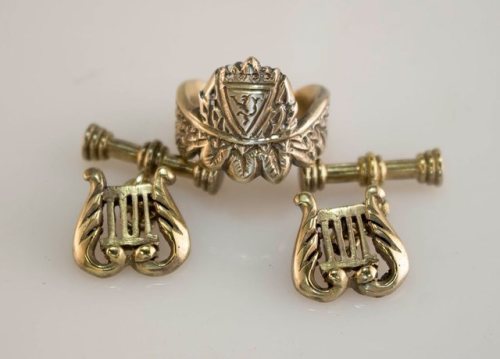
The heraldic attitude of the lion is rampant (i.e., reared up): it stands on its hind legs with its forelegs raised, as though attacking, and its head is forward-facing: it looks forward, toward the future.
Obviously in popular symbolism, lions represent bravery, and that definitely fits Aziraphale. He's literally leaving the only person who has ever loved him to go make the universe a better place for that person and for everyone, and he's going alone amongst the people who have despised and shamed him his whole existence and tried to kill him at least once; those people are mfing Heaven and have been entrenched in their power for thousands or millions of years. It doesn't get a whole lot braver than that.
In Christian symbolism specifically, the lion represents Christ. (He's referred to in the book of Revelation as the "lion of Judah" because the heraldic symbol for the tribe of Judah was a lion and Jesus was said to be from the tribe of Judah because his [step]father Joseph was from Judah.)
Normally when a story draws a parallel between a character and Christ, the parallel is one of self-sacrifice. That's not what's happening here. When symbolism for Christ represents his self-sacrifice, Jesus is invariably associated with a lamb--the sacrificial lamb--not a lion. When that symbolism represents Christ's mercy or holiness or divine nature/ordination, the dove of the Holy Spirit is used.
But the lion is a symbol inherited from the Old Testament. It represents royalty, power, threat, and seizure from others by force. Jesus is symbolically depicted as the lion upon his return to Earth during the book of Revelation. The lamb is Jesus' self-sacrifice and death for the sins of humanity, but the lion is Jesus' return, powerful, royal, and triumphant.
Does Aziraphale's ring foreshadow his involvement in the Second Coming of Christ? Probably! Is it a symbol that Heaven is the proverbial (and biblical) "lions' den" where they should be doves and lambs? Maybe.
I think it more likely that Aziraphale himself will be the lion, on a righteous rampage like Jesus chasing the moneylenders from the steps of the temple, telling them "It is written, My house shall be called the house of prayer; but ye have made it a den of thieves." Because the ring is a signet ring, meant to impress a seal that legally represented the wearer as an individual. So the lion is linked to Aziraphale himself.
Aziraphale is soft. It is one of his very best qualities. And soft and weak are not the same thing: because he is soft, he tried to kill the Antichrist, a child. Because he is soft, he stood alone before a demon in defiance of the will of Heaven and demanded with no power whatsoever to back him up that the demon spare children whose murder God had authorized. He, an angel of God, worked with a demon to deceive the Heavenly Host and, as he points out himself, thwart the will of God. Even before that, because he was soft, Aziraphale gave humans the gift of fire and self-protection and then lied to God Herself about it. I mean it literally does not get any more courageous than that.
And I can't stop thinking about what that lion, and that softness, and the link between the two is going to mean for S3.
#good omens#good omens 2#good omens aziraphale's ring#aziraphale's ring#aziraphale#good omens analysis
446 notes
·
View notes
Text
Four is Jesus (Part 2)
@not-freyja I did not forget about this! I just had too many incoherent thoughts I needed to sort out, but now I have some more thoughts for my whole “Four is Jesus” headcanon.
What roadblocked me a lot was that the religion of Hylia is already very heavily based in Christian motifs and symbols. So I really want to shout out @trash-aged-like-fine-wine for their reblog of my post (read it here seriously) which helped me figure out some things like:
pre-four swords era = the old testament
Four sealing away darkness = "dying for our sins"
the Palace of the Four Swords = the cave Jesus was buried in
So with that out of the way I had to figure out the details of Four's sacrficie. Since the religion is Christian-like and idk if crucifixion would fit into Legend of Zelda, I don’t want Four to just get crucified but I also didn’t know how to make him sacrifice himself in a way that could somehow create a cross motif. Then I thought about getting stabbed/sealing yourself in a sword. It fits for sacrifice. And swords kinda look like crosses. The idea is that over time the religious motif of a sword simplified into a cross shape.
This is the direction I think I want my Christian-like religion to go. It’s a split from the normal Hylian religion, kind of like how Christianity split from Judaism. So Hylia is still the main god, but some subset of Hylians decided Four was somehow related to Hylia. Those details are still in the works. I’m thinking maybe he was brought down from the sky or something since he’s the Hero of the Minish and the Minish reportedly came from the sky. Religion does have an element of truth to it (spiritual religions are based in nature, most polytheistic gods have something to do with natural forces, Jesus was a real person who existed. This is the sort of thing is what I’m talking about), but the thing that’s really fascinating to me is how humans interpret it into being divine. So I’m both focusing on the real thing that happened, and how people would later interpret it.
Which brings me to Four’s sacrifice. Most of my fics and worldbuilding overlap, so I’m going to just *nabs my idea for Ruthlessness from my Cost of Courage/Epic AU*. Four sacrifices himself for Shadow by either being killed by a powerful foe (no it’s not Fierce Deity like in my Epic AU that detail might be changing anyway) or, more likely, sealing himself into the Four Sword to save Shadow (which I said in my previous post could be interpreted as saving everyone, since the idea is that people believe Shadow is the manifestation of our sins.) This is seen as the Ultimate Sacrifice. This opens up very valid beliefs of a second coming. It also can kind of explain the cross motif without making Four have to get crucified. And best yet, it’s at least semi-canon compliant.
I know Four’s games (and I think he’s also merged with the Hero of Men from Minish Cap’s opening???) can somehow be interpreted as religious stories. Especially with the light force thing going on, and literally killing a demon thing. And I know I’m also going to pull stories from my Lorule worldbuilding (it’s coming! It’s coming!), so I think there’s enough there to theoretically make a religious book promoting similar ideas to Christianity. I cannot stress enough that I’m aiming for Christian-like instead of “hey let’s dump Christianity with no extra thought into LoZ for the fun of it.” Most of things that make Christianity Christianity don’t even exist in LoZ!
But uh yeah. Here’s more thoughts on that. Lorule stuff will come in a part 3… eventually.
#the saga finally continues#felt like this was something that needed clarification#don’t worry I have Rambles about Lorule#and about the Downfall Timeline in general#anyways#linked universe#lu four#four is Jesus saga#collectors worldbuilding rambles
32 notes
·
View notes
Note
It says in your little thing that your Mormon, are you still Mormon cuz respectfully I've heard a lot of shit about Mormons and how they are very transphobic and homophobic! So not trying to be rude just genuinely wondering if I read that wrong or something.
Hey! Yeah, I am a mormon, but I love all my queer siblings, including/especially my trans people. But it's a complicated religion and I have a complicated relationship with it, so I understand the confusion.
The short answer is that I was raised mormon, continue to find a lot of comfort and truth in SOME of their teachings, and I am perpetually very pissed with a lot of their other teachings, cuz yeah, a lot of them are Not Good. So I'm mormon and mad about it. It's kind of like. . .imagine if you were raised Catholic and only really have good memories of your Catholic community and find a lot of comfort in teachings about God's love, but you absolutely despise the administration of the Catholic church and like, everything they say about queer people. It's like that.
The long answer is this:
A) The mormons get a bad rap on the internet for stuff that isn't actually true. If you ever have a specific question, I am happy to answer to the best of my abilities.
B) Having said that, a lot of the teachings of the mormon church regarding queer people are really really bad and I do not support or encourage this even slightly. I myself am queer, and I have to put up with hearing all kinds of queerphobic shit from the church all the time. And I hate it and I speak against it whenever it is safe for me to do so. It just. All of it goes soooo against the other teachings of the church. I am not the only queer member. There is an entire community of us on tumblr over here. We all work and suffer through it together.
C) I still believe in the stuff that's at the fundamentals of the gospel though. Namely, God exists and he loves all of us unconditionally. He sent us to Earth so that we could learn and grow and become happier through our experiences here. Free agency/the ability to make independent choices is very VERY important to him. He sent Jesus Christ to suffer for our sins so that when we do fuck it up, we don't have to live with that guilt forever. Jesus also suffered for our pain and sorrow so that we didn't have to and can bring us healing. We're supposed to love our neighbors with our whole hearts.
I also believe that Joseph Smith did translate the Book of Mormon, although he was still a human being who made mistakes and I don't believe in a LOT of the stuff he said and did. I doubt you've read the Book of Mormon, but it's really just The Bible Extended Edition. There's a reason it's full name is The Book of Mormon: Another Testament of Jesus Christ. It covers what the hell was going on in the Americas during the biblical times.
I also believe that God has chosen prophets for our modern day to continue giving us revelation. I also believe those prophets are mostly crusty old men with outdated personal opinions that they mistake for revelation, that they fuck it up a lot, and I wish a lot of them would hurry up and die so I no longer have to listen to their bullshit.
D) Religion and faith are personal. I'm not here to convert anyone, especially other queer people. I continue practicing my religion because I have had literal years and some really amazing people to help me sort out what is good and bad and to figure out what parts of it are best for me as a person. I understand that what's best for some people is literally none of it, and I also understand that while some people could benefit from just doing what I do, that the way the church treats queer people (and also women sometimes) does more harm than the good parts help. So while I talk about my religion sometimes, it's always more about my personal relationship with it and never to try to convert people. I fully support ex-mormons who left the church, because sometimes the environment can be truly toxic and the religious trauma they have experienced is real.
E) The culture of the church and the actual doctrinal teachings of the church are two very different things. Utah mormon culture is also different than regular mormon culture. All of these things have good aspects to them, but church culture and Utah mormon culture also have a lot of really harmful things too, and these don't even have anything to do with the crusty old men being homophobic/transphobic. I am also mad about this, and I also complain about this fairly frequently.
I'm glad you asked because I understand that this stuff can be confusing. I think it's impossible to be any kind of religious queer person and not have a really complicated and deeply personal relationship with your religion.
I hope that answered your question, and I completely understand if this makes my blog feel like an unsafe space for you and you feel like you need to unfollow me. I do, however, tag every church related post I make, both with a religion cw and the tumblr mormon tag. Do what's best for you, and much love.
Also, unrelated, but I really appreciate all the posts you make and every time I see a little notification from you on one of my posts, it makes me so very happy.
#giraffe's ramblings#tumblrstake#cw: religion#tw: religion#mormonism#mormon#asks#my very liberal parents are probably the only reason I can stay in the mormon church#because they fully support queer people and are some of the kindest people alive#and they were very clear about their opinions whenever one of the church's wrong teachings came up#if I had more fundamentalist parents I would almost certainly be an ex-mormon#but my parents my friends and my little community of religious tumblr gays helps me through it and lets me stay for the good parts#beloved mutuals
19 notes
·
View notes
Text



BIBLE STUDY: #1
─ ✩ “In the following study, we will reflect on seeking God's wisdom, protection, peace, and justice. Most importantly, we will learn to trust in God's hands, knowing that He always knows what is best for us. In the end, His plans are greater than ours!”
Books used on the following study: Psalms

STRENGTH AND OBEDIENCE
Psalm 19:11 "Therefore, by them, Your servant is warned; In keeping them there is great reward." By following God's commands, we are warned, and there is great reward in obeying Him.
Psalm 19:13 "Moreover, keep Your servant from willful sins; do not let them rule over me. Then I will be innocent and cleansed from blatant rebellion." This verse highlights the importance of humility and obedience to God’s commandments and warns against the arrogance and self-righteousness that can lead to sin.
1. Why is self-righteousness wrong? The concept of self-righteousness implies a belief that one's salvation is based on their own actions or works, rather than the sacrifice of Jesus on the cross for our sins. We don't deserve Heaven on our own merits, but it's only through the love and grace of God, through our faith and acceptance of Jesus' sacrifice, that we can be made righteous.
2. In modern times, how can we replace the offerings made back then? While modern times may not include traditional burnt offerings like in the Old Testament, we can still offer our sacrifices to God through our actions and our daily lives. This could mean giving up harmful habits and behaviors, volunteering our time and resources to help others, or even simply doing our best to obey God's commandments in everyday situations. Let us also make time daily to strengthen our relationship with God.
TRUST AND LOVE
Psalm 21:2 "You have given him his heart's desire and have not denied the request of his lips." This verse speaks about trust and gratitude to God, expressing the speaker's faith in God's love and sovereignty.
Psalm 21:7 "For the King relies on the Lord; through the faithful love of the Most High he is not shaken." The king encounters difficulties and threats, the love and support of God will ensure that he remains strong and protected, and he will never be broken or overcome by misfortune.
Psalm 46:4-5 "There is a river its steams delight the day of God, the holy dwelling the place of the *Most High. God is within her; she will not be toppled. God will help her when the morning dawns." These verses convey the assurance of God's presence, protection, and timely help for His people, offering hope and security amidst any adversity.
Psalm 57:3 "He reaches down from heaven and saves me, challenging the one who tramples me. God sends His faithful love and truth." This phrase portrays a vivid image of God actively intervening in our life. It emphasizes God’s willingness to descend from His heavenly throne to rescue those in distress.
Psalm 118:18 "The Lord disciplined me severely, but He did not hand me over to death." God discipline us not to ultimately punish us but to shape us into better people. We must recognized that the severity of the discipline is a reflection of God's concern for our growth and righteousness. Despite the severity of the discipline, we are thankful that God has not allowed us to face ultimate destruction or death.
GOD'S PROTECTION
Psalm 23:4 "Even if I go to the darkest valley, I fear no danger, For you are with me; You anoint on my head with oil; my cup overflows." This is a declaration of trust and faith in God, emphasizing that even in darkness, we are comforted by the presence of God, who promises to protect and guide us.
Psalm 34:7 "The Angel of the Lord encamps around those who *fear Him, and rescues them." This verse highlights the protective presence of God and His angels, specifically for those who fear and worship Him.
Psalm 27:2"When evildoers came against me to devour my flesh, my foes and enemies stumbled and fell." The expression “to devour my flesh” uses vivid imagery to describe the intensity of our enemie's intentions—it's as if they are determined to utterly destroy us. But in the end, God caused our enemies to falter and be defeated.
THE WICKED AND JUSTICE
Psalm 73:6 "Therefore, pride is their necklace and violence covers them like a garment." This phrase implies that the wicked wear their pride openly and with arrogance as if it were an accessory like a necklace. Just as clothing envelops a person, violence is said to cover the wicked. This means that their lives are characterized by cruelty and aggression. Violence defines their actions, and they engage in harmful and unjust lifestyles.
Psalm 73:7 "Their eyes bulge out from fatness; the imaginations of their hearts run wild." Fatness in the Bible often symbolizes wealth and abundance. The imagery of eyes bulging out suggests that the wicked are so well-fed and prosperous that their wealth is excessive. And untimely the desires and thoughts of their hearts are uncontrolled, ambitious, and often wicked.
Psalm 73:8 "They mock, and they speak maliciously; they arrogantly threaten oppression." They are known for their mockery and malicious speech, meaning they ridicule others and speak in harmful or spiteful ways. The wicked not only speak maliciously, but they also use their power or influence to threaten and oppress others.
Psalm 73:16 "When I tried to understand all this, it seemed hopeless until I entered God’s sanctuary. Then I understood their destiny." The psalmist on this, Asaph, is struggling to make sense of why the wicked seem to prosper endlessly while the righteous suffer. He observed the arrogance and success of the wicked, and it deeply troubled him, making him confused and frustrated. But when Asaph enters the sanctuary, he gains a spiritual perspective, a new perspective. Asaph gains clarity about the ultimate fate of the wicked. While they may seem to prosper, their success will come to an end. Their end will be one of judgment and destruction.

─ ✩ “This is all for today! Thanks for joining me in this Bible study, remember to ask for guidance to the Lord before reading. And reflect his word in our daily lives. Remember God love us, we aren’t too far from him. See you all next study!”
#֪ ⠀ ׂ 𓏲*ੈ ۪ ★ 𝐁𝐈𝐁𝐋𝐄 𝐒𝐓𝐔𝐃𝐈𝐄𝐒 ۪ܺ ࿐#christianity#God#Jesus Christ#christian faith#Christian blog#Bible#bible verse#bible study#protestant#catholiscism#orthodox#faith#christian living#christian Bible#personal#girlblogging#christian girl#i love jesus#scripture
11 notes
·
View notes
Text
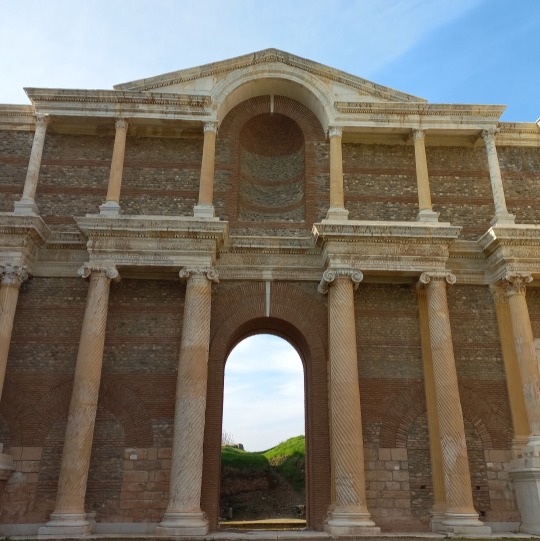
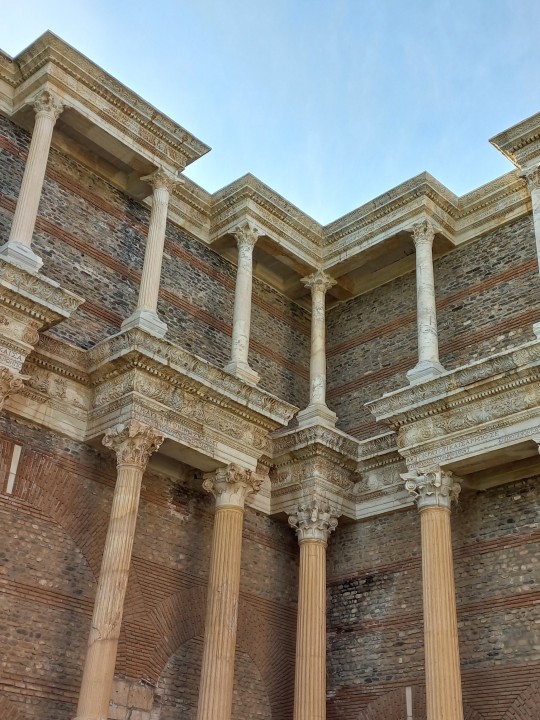
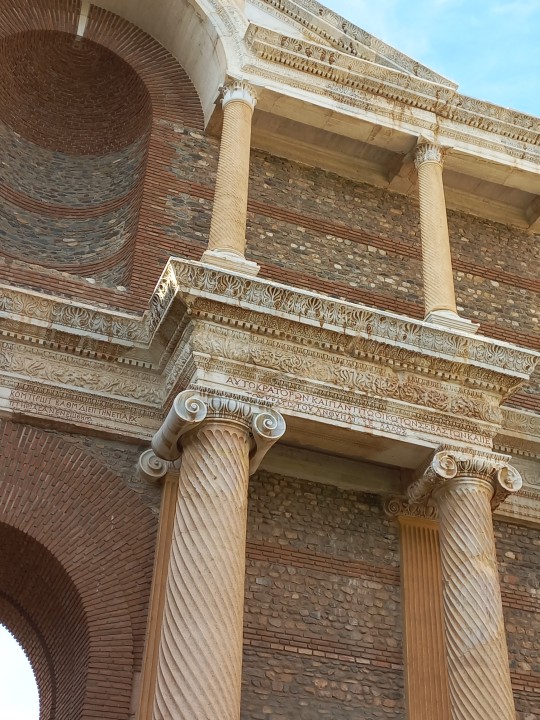
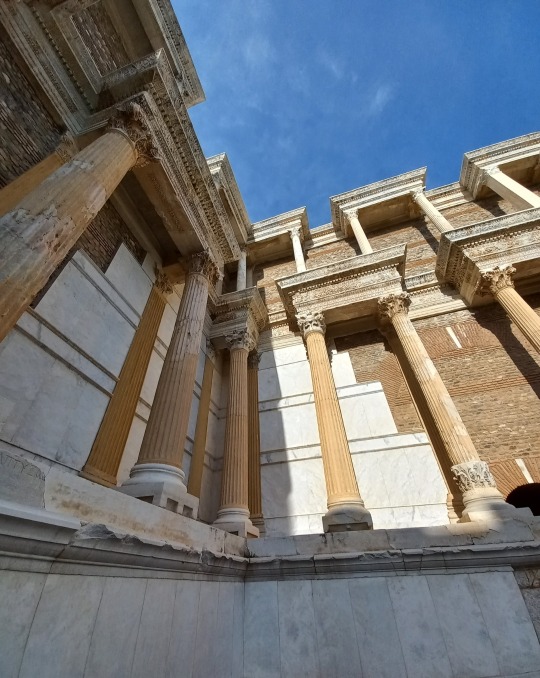
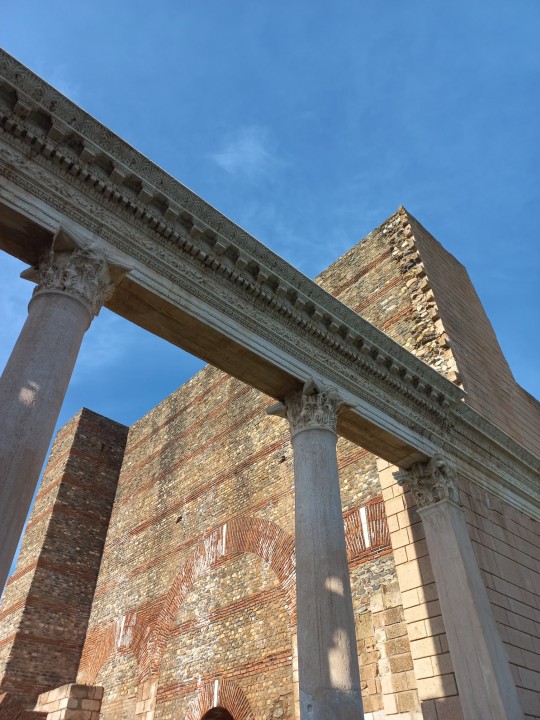
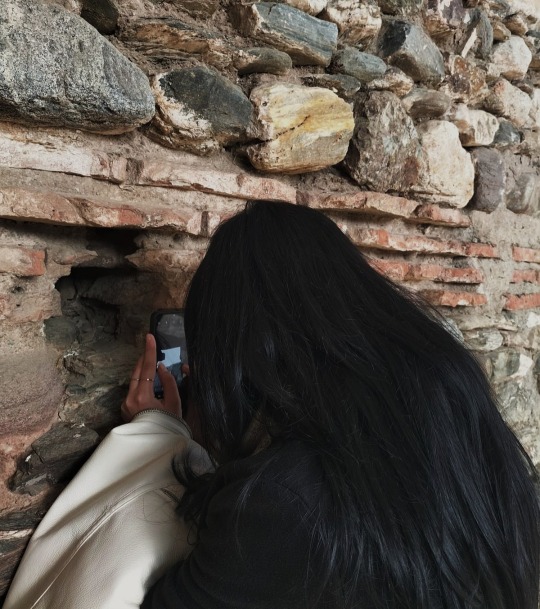
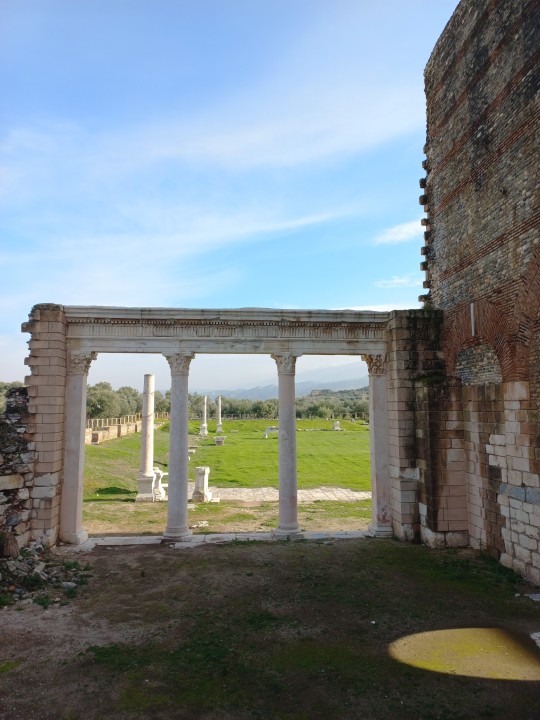
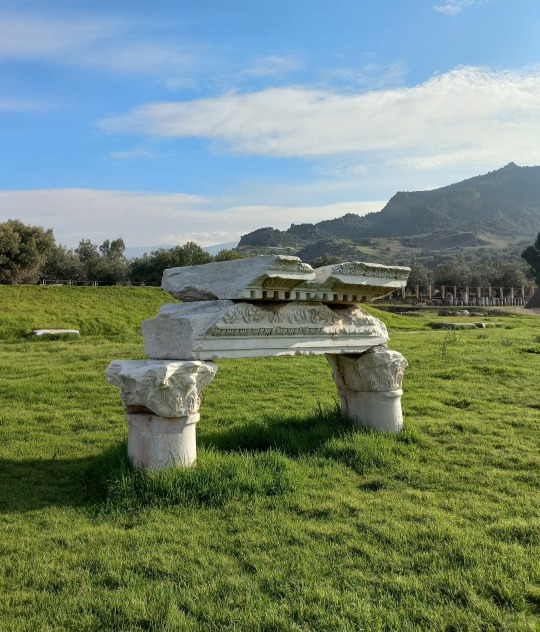
Sat, Jan 12 - I visited the ancient Roman city of Sardes today for the first time. (Information about the city is under this post.) It consisted of the Gymnasium with the remains of many Byzantine shops including restaurants and painting shops, a public pool, tombs, and a Synagogue. It was truly refreshing to see the place overall, but what I adored about the visit was the fact that you could imagine and experience the feeling of what it was like to be living in an ancient city, as it was empty because of the weather conditions. No voices, no noise, no motion, just the smell and the air of this ancient place. (I bet Henry Winter would die for it.) The Temple of Artemis was also close and I went there as well. I'll publish the pictures from the Synagogue and the Temple next if you want to check them out.
Sardis (/ˈsɑːrdɪs/ SAR-diss) or Sardes (/ˈsɑːrdiːs/SAR-de ess; Lydian: 𐤳𐤱𐤠𐤭𐤣, romanized: Sfard; Ancient Greek: Σάρδεις, romanized: Sárdeis; Old Persian: Sparda) was an ancient city best known as the capital of the Lydian Empire. After the fall of the Lydian Empire, it became the capital of the Persian satrapy of Lydia and later a major center of Hellenistic and Byzantine culture. It is now an active archaeological site in modern-day Turkey, in Manisa Province near Sart.
In 334 BC, Sardis was conquered by Alexander the Great. The city was surrendered without a fight, the local satrap having been killed during the Persian defeat at Granikos. After taking power, Alexander restored earlier Lydian customs and laws. For the next two centuries, the city passed between Hellenistic rulers including Antigonus Monophthalmos, Lysimachus, the Seleucids, and the Attalids. It was besieged by Seleucus I in 281 BC and by Antiochus III in 215-213 BC, but neither succeeded at breaching the acropolis, regarded as the strongest fortified place in the world. The city sometimes served as a royal residence, but was itself governed by an assembly.
In this era, the city took on a strong Greek character. The Greek language replaced the Lydian language in most inscriptions, and major buildings were constructed in Greek architectural styles to meet the needs of Greek cultural institutions. These new buildings included a prytaneion, gymnasium, theater, hippodrome, and the massive Temple of Artemis still visible to modern visitors. Jews were settled at Sardis by the Hellenistic king Antiochos III, where they built the Sardis Synagogue and formed a community that continued for much of Late Antiquity.
In 129 BC, Sardis passed to the Romans, under whom it continued its prosperity and political importance as part of the province of Asia. The city received three neocorate honors and was granted ten million sesterces as well as a temporary tax exemption to help it recover after a devastating earthquake in 17 AD.
Sardis had an early Christian community and is referred to in the New Testament as one of the seven churches of Asia. In the Book of Revelation, Jesus refers to Sardians as not finishing what they started, being about image rather than substance.
I take the pictures that are on my blog myself. In case you're interested in this post, I also post/reblog content including travel/cultural pictures, books, book recommendations, analysis, quotes, anything related to movies, series, and girl blog entries.
#sardes#ancient rome#ancient greek#gymnasium#ancient history#ancientmonuments#roman architecture#archeology#blog#travel#history#the secret history#henry winter#synagogue#dark academia#aesthetic#light academia#books#girlblogging#hellenistic#reading#if we were villains
40 notes
·
View notes
Text
nobody could decide which stories they wanted me to share. they want me to share all of them 😭😭
i’ll start with jesus and john and why i think they’re gay for each other, supported by biblical evidence provided by Seton Catholic Homeschooling of America.
• i took this course in my tenth grade year. i was only homeschooled for 9th and 10th grade. i was public schooled before then, and later went to boarding school for my last two years of hs. but that’s another post.
this is a long post. buckle in. i’ll have it all below the cut
• i no longer have the textbook title, and only have pictures from this text book that i took in a delusional haze when reading this in my catholic mother’s household, hoping that she wouldn’t look through my phones photos to find these images.
this is all from a catholic standpoint, other forms of christianity are not accounted for. if you do not want to see GAY CONTENT ABOUT JESUS, move along
this post is about to unlock so much of my old hyperfixation on the catholic church that i had before leaving.
first of all, as backstory for those who don’t know john:
• john is one of jesus’ twelve disciples and wrote the Gospel of John (I, II, and III) which is a hella important book in the new testament (the second half of the bible.)
• the books of john tell the story of jesus’ life from birth to death. now, that’s kinda gay to write about another man that much, hmm.
• john has also earned the affectionate title of: “The Beloved Disciple”
• he is also traditionally credited with writing Revelations (also known as Apocalypse, which tells how the world is gonna end. fun right!!), though scholars are unsure if he wrote it, or a different john wrote it.
okay, now onto the gay stuff:
• most people jokingly ship judas and jesus because of the angst of judas’ betrayal to jesus. however, i disagree.
• though, knowing their ages, shipping jesus and john would be quite problematic these days, it was quite an acceptable age gap back then. jesus was around the ages of 30-33 at the time of his death, and john was a young adult, about 18. (yikes)
• my evidence begins with the way john writes about himself and jesus in the Gospel of John. in his gospel, he never calls himself john. you guys know what he calls himself in his gospel?? “the discipline whom jesus loved”
😐
sir. could you be ANY more obvious??
so far, all of this info is directly from my catholic textbook.

WOW! that page unpacks a lot. let me elaborate on the way john leaned up on jesus’ chest. first of all, that’s a real bible quote. let’s go:
John 13:23-25
• “23 One of his disciples, the one Jesus loved, was at the table to the right of Jesus in a place of honor. 24 So Simon Peter gestured to this disciple to ask Jesus who it was he was referring to. 25 Then the disciple whom Jesus loved leaned back against Jesus’ chest”
the passage then goes on to john (the disciple whom jesus loved) asking jesus who’s gonna betray him.
• to FURTHER add to this gay af moment, there are PAINTINGS of it, completed by MULTIPLE artists. i’m going to provide the image in my textbook, and then images found online that i particularly enjoy.
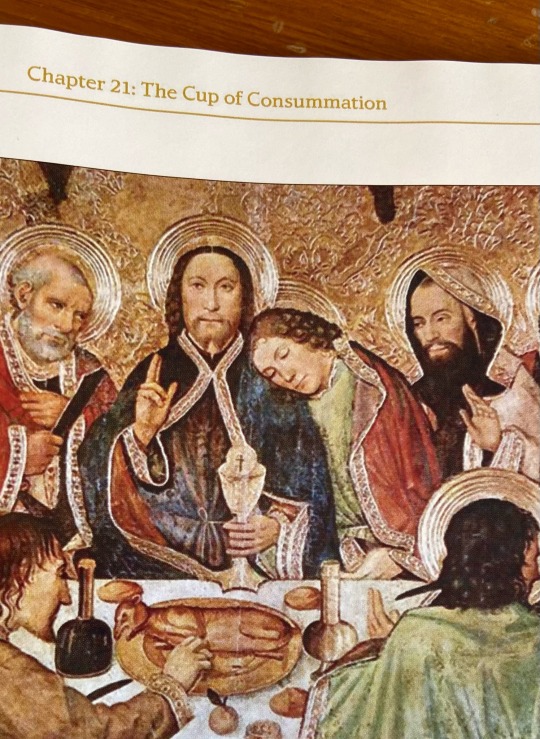
above: lovely image! i cannot remember the artist for the life of me.

above: Jesus and John at the Last Supper by Valentin de Boulonge
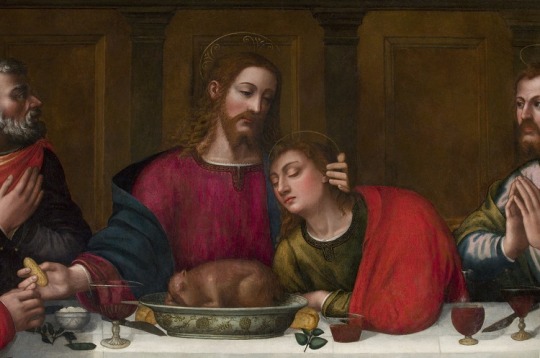
above: Last Supper by Plautilla Nelli (portions of the image were cropped)

above: cannot find artist’s name.
• if you are interested in finding hundreds more of images like this, all you need to type into google is “john leaning on jesus”. you’ll get the images you need. trust me
• those were my largest pieces of evidence, but there are smaller ones i’d like to share. the textbook helped “gay it up”. i think the author of this textbook was a closeted homosexual. cause no way did a straight person write this thinking “hmmm that’s totally platonic and not at all queer, cause that’s how i feel about MY best friend.”
here’s direct textbook images:
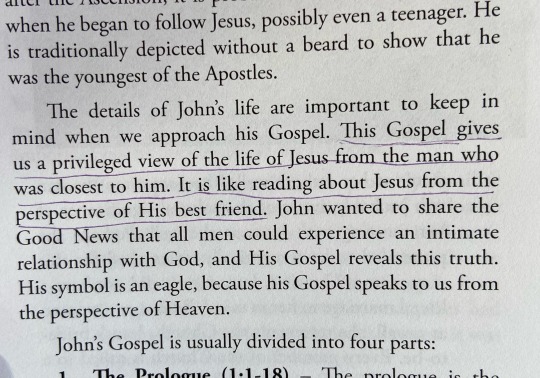
• hmmm man who was closest to him you say???
• “intimate relationship with God”
• best friend? 🤔 are we sure about that?
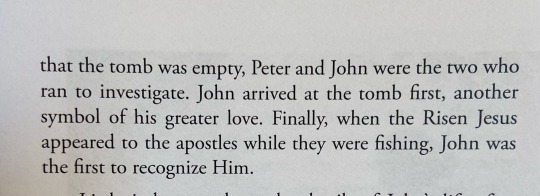
• symbol of his greater love?
• AND he was the first to recognize jesus??
• y’all. they’ve got to be shitting me atp. no way were they not In Love
and finally, from my study questions:
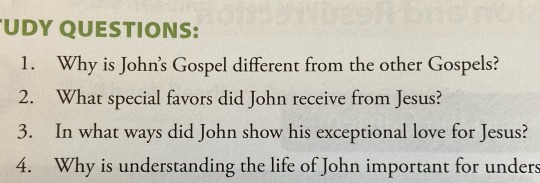
y’all. special favors? exceptional love?
this textbook had me GOBSMACKED. jaw DROPPED. WDYM THAT JESUS AND JOHN WERE DEFINITELY IN LOVE???
conclusion:
• i HIGHLY recommend you looking up more pictures of john laying on jesus.
• i think of john/jesus as canon. there’s too much evidence to support my point. including The Bible. judas/jesus is like what fanfics are for. they’re the pair that everyone wishes happened in canon, but the authors sucked, so it didn’t.
• literally, drop any questions in the reblogs and comments. i’ll be HAPPY to answer.
(and jesus/judas shippers, i hope i changed your mind.)
#jesus x john#jesus x judas#anti catholic#anti christianity#(putting those in so catholics can filter this post out)#last supper#valentin de boulogne#ex christian#ex catholic#anti religion#ex religious#cress talks way too much
22 notes
·
View notes
Text
ICON, SAINTS&READING: SATURDAY, SEPTEMBER 21, 2024
september 8_september 21
THE NATIVITY OF OUR MOST HOLY LADY THE THEOTOKOS AND EVER VIRGIN MARY

By Fr. Alexander Schmemann
The Church’s veneration of Mary has always been rooted in her obedience to God and her willing choice to accept a humanly impossible calling. The Orthodox Church has always emphasized Mary’s connection to humanity and delighted in her as the best, purest, most sublime fruition of human history and of man’s quest for God for ultimate meaning, for the ultimate content of human life. If in Western Christianity, veneration of Mary was centered upon her perpetual virginity, the heart of Orthodox Christian East’s devotion, contemplation, and joyful delight have always been her Motherhood, her flesh and blood connection to Jesus Christ. The East rejoices that the human role in the divine plan is pivotal. The Son of God comes to earth, appears to redeem the world, He becomes human to incorporate man into His divine vocation, but humanity takes part in this. If it is understood that Christ’s “co‐nature” with us is as a human be‐ ing and not some phantom or bodiless apparition, that He is one of us and forever united to us through His and forever humanity, then devotion to Mary also becomes understandable, for she is the one who gave Him His human nature, His flesh and blood. She is the one through whom Christ can always call Himself “The Son of Man.” Son of God, Son of Man…God descending and becoming man so that man could become divine, could become partaker of the divine nature (2 Peter 1:4), or as the teachers of the Church expressed it, “deified.” Precisely here, in this extraordinary revelation of man’s authentic nature and calling, is the source of that gratitude and tenderness that cherishes Mary as our link to Christ and, in Him, to God. And nowhere is this reflected more clearly than in the Nativity of the Mother of God.
ICON: SOPHIA THE WISDOM OF GOD OF KIEV

The Icon of Sophia, the Wisdom of God (Kiev), occupies an unique place in the Russian Orthodox Church. On the icon is depicted the Theotokos, and the Hypostatic Wisdom, the Son of God incarnate of Her.
In Wisdom or Sophia, ponders the Son of God, about Whom in the Proverbs of Solomon it says: “Wisdom has built a house for herself, and has set up seven pillars” (9:1). These words refer to Christ, the Son of God, Who in the Epistles of Saint Paul is called “Wisdom of God” (1 Cor.1:30), and the word “house” refers to the Most Holy Virgin Mary, of Whom the Son of God is incarnate.
The arrangement of the icon bears witness to the fulfillment of this prophecy. On the Kiev icon of Sophia is a church, and standing there is the Mother of God in a robe with a veil on her head, under an archway of seven pillars. The palms of Her hands are outstretched, and her feet are set upon a crescent moon. The Theotokos holds the Pre-eternal Christ Child, blessing with Her right hand, and holding the Infant with Her left.
On the cornice of the entrance are inscribed the words from the Book of Proverbs: “Wisdom has built a house for herself, and has set up seven pillars.” Over the entrance are depicted God the Father and God the Holy Spirit. From the mouth of God the Father issues the words: “I am affirmation of Her footsteps.”
Along both sides the seven Archangels are depicted with outstretched wings, holding in their hands symbols of their duties. On the right side: Michael with flaming sword; Uriel with a lightning flash hurling downwards; Raphael with alabaster vessel of myrrh. On the left side: Gabriel with a lily blossom; Selaphiel with a scale; Jerudiel with royal crown; and Barachiel with flowers on a white shawl.
Under a cloud with the crescent moon, serving as a footrest for the Mother of God, is a staircase with seven steps (depicting the Church of God on earth). Those standing on the seven steps are the Old Testament witnesses of the manifestation of Wisdom, the Forefathers and the Prophets.
On each of the seven steps are inscribed faith, hope, love, purity, humility, blessedness, and glory. The staircase's seven steps are set upon the seven pillars, on which images are inscribed, and their explanations are taken from the Apocalypse.


Philippians 2:5-11
5 Let this mind be in you which was also in Christ Jesus,6 who, being in the form of God, did not consider it robbery to be equal with God, 7 but made Himself of no reputation, taking the form of a bondservant, and coming in the likeness of men. 8 And being found in appearance as a man, He humbled Himself and became obedient to the point of death, even the death of the cross. 9 Therefore God also has highly exalted Him and given Him the name which is above every name, 10 that at the name of Jesus every knee should bow, of those in heaven, and of those on earth, and of those under the earth, 11 and that every tongue should confess that Jesus Christ is Lord, to the glory of God the Father.
Luke 10:38-42; 11:27-28
38 Now it happened as they went that He entered a certain village; and a certain woman named Martha welcomed Him into her house. 39 And she had a sister called Mary, who also sat at Jesus' feet and heard His word. 40 But Martha was distracted with much serving, and she approached Him and said, "Lord, do You not care that my sister has left me to serve alone? Therefore tell her to help me." 41 And Jesus answered and said to her, "Martha, Martha, you are worried and troubled about many things. 42 But one thing is needed, and Mary has chosen that good part, which will not be taken away from her. 27 And it happened, as He spoke these things, that a certain woman from the crowd raised her voice and said to Him, "Blessed is the womb that bore You, and the breasts which nursed You!" 28 But He said, "More than that, blessed are those who hear the word of God and keep it!"
#orthodoxy#orthodoxchristianity#easternorthodoxchurch#originofchristianity#spirituality#holyscriptures#gospel#bible#wisdom#faith#virgin mary#theotokos#icon#sacredart
7 notes
·
View notes
Note
So I kinda grew up in an evangelical environment, and I'm just now able to expose myself to and learn about other religions. The only things I learned about Judaism growing up were likely very twisted to suit the teachings of the pastors. I heard a lot about "messianic Jews" (which I now know is very much not a thing) and how "a lot" of Jewish people converted because they began to believe that Jesus was the messiah (yeah it was bad, really bad)
Anyways since I'm trying to educate myself, I'm trying to not just read about other religions, but if possible, I'm trying to read the holy books of the religions as well. I talked to a Muslim friend I had at work and he told me I could read the Quran (I guess I felt weird about reading it because I wasn't looking to convert to Islam). In the same vein, could I read the Talmud to learn more? I was told that the Bible and the Talmud were the same growing up (so there was no point in reading it, according to my elders, also incorrect information). Is there a particular translation that would be better to read?
Very sorry for all the parenthetical statements I was trying to keep it brief but I have severe adhd so thoughts just come at they please. Love your blog, and I'm very happy to be learning a lot from you already, and unlearning a lot in the process, so thank you for posting resources and the like. Very appreciated.
Could I read the Talmud to learn more?
The short answer is: Reading the Talmud without knowing how or what you are reading will not give you the information you are looking for. The sentiment of reading to learn more is wonderful, but on your own without any prior learning, it is tantamount to reading a book in a language you don't speak to understand the poetry of the language better. You can do it, but you won't have the tools to decipher it in any meaningful way. If you want to learn more about Judaism, studying Talmud is definitely not the place to start.
There is something called Daf Yomi where Jews study one single page of Talmud every single day. With 2,711 pages in the Talmud, one Daf Yomi cycle takes about 7 years, 5 months--and it takes this long because studying the Talmud to understand the Talmud is not just reading a book. There are ways you can just read it, sure, but that doesn't mean you will be learning or understanding what you are reading in the way that Jews do (just as you can read a series of random words without actually comprehending what is in front of you).
If you're looking to study Talmud, have you studied Torah with Jews? Begun to understand the Jewish perspective on the Torah? How we approach our texts with a completely different eye than Christians? How the Old Testament you grew up with may look nothing like what we know and love?
If you're certain that the answer to those questions is yes, and you feel ready to start learning Talmud, see if there is a local rabbi in your area who offers a class or a seminar. Many are free. It is meant to be a community activity. But chances are, that isn't the case.
But frankly: you don't need to study Talmud to learn about Jews and Judaism. There is no need for that. The best way to learn about Judaism is always going to be listening to Jews. Listen to our conversations, hear us, and read the resources we create to share about Judaism. One of the greatest barriers that people often face is shedding the unrealized paradigm and perspective that is left from an evangelical upbringing. Challenging those perspectives is paramount.
If you feel more than a small draw to know, you can go ahead and study Torah, and maybe eventually study Talmud, but if all you want is to know more about Judaism, studying Talmud is not step one.
This is the layout of a Talmud page in Hebrew--it is much more than just a straightforward reading, especially if you want to genuinely engage with the text.

This is, of course, but the opinion of one. The Jewish community is made up of more opinions than individuals and all deserve to be heard.
110 notes
·
View notes
Text
It's the most wonderful time of the year- time for @terrortracks! I'll post my playlists here, along with covers and liner notes or at least a little bit of insight into why I chose these specific tracks.
First up is my playlist for Day 1- explorer of choice!


If you've been here longer than 5 minutes, you know that my favorite expedition is the Karluk, but my favorite guy is actually Joseph Stenhouse, of Ross Sea Party fame. I've never related to a polar guy more, and I project onto him in a way that is probably less than healthy. There's a reason he's the sun sign in my explorerscope.
ANYWAY, he is best known for getting the Aurora back to safety and for sinking u-boats with his bestie Frank Worsley during the war. Later in his life, though, he served as the captain of the Discovery during the Discovery Oceanographic Expeditions of 1925-1927! This was a bad time for everyone involved, as Stennie was fighting with the scientific team non-stop, witnessing absolutely horrific animal cruelty at the Grytviken whaling station, dealing with his own crippling anxiety, depression, and (probable) PTSD, and coming to the painful realization that the age of sail was over and the skills he dedicated his life to perfecting were no longer valuable or necessary. It was an impossibly hard pill to swallow.
This playlist features songs about feeling awkward, out of place, uncomfortable, sad, too old, and not enough. I'm sure none of you can relate to that- me neither!
1. ballad of a homeschooled girl- Olivia Rodrigo
I broke a glass, I tripped and fell, I told secrets I shouldn't tell I stumbled over all my words, I made it weird, I made it worse Each time I step outside, it's social suicide
2. Ashamed- Deer Tick
Murdered my throat, screaming bloody all night Hit him with a book and how he crumbles So, you should have seen how the arches tumble They're golden no more, now I'm smiling in my blood I'm caught in a whirlwind, I'm going to heaven I'm standing on trial and it's painted on canvas An eternal testament to how we are so animalistic
3. Crack Baby- Mitski
Crack baby, you don't know what you want But you know that you had it once And you know that you want it back Crack baby, you don't know what you want But you know that you're needing it And you know that you need it bad
4. Mariners Apartment Complex- Lana Del Ray
They mistook my kindness for weakness I fucked up, I know that, but Jesus Can't a girl just do the best she can? Catch a wave and take in the sweetness Think about it, the darkness, the deepness All the things that make me who I am
5. Calamity Song- The Decemberists
And you've receded into loam And they're picking at your bones Will call cold We'll come home
6. Bite The Hand- boygenius
Here's the best part distilled for you But you want what I can't give to you Your hands are gravity while my hands are tied
7. Ship To Wreck- Florence and the Machine
What's with the long face? Do you want more? Thousands of red-eyed mice, scratching at the door And don't let the curtain catch you, cause you've been here before The chair is an island, darling, you can't touch the floor
8. A Better Son/Daughter- Rilo Kiley
And sometimes when you're on, you're really fucking on And your friends they sing along and they love you But the lows are so extreme, that the good seems fucking cheap And it teases you for weeks in its absence But you'll fight and you'll make it through You'll fake it if you have to And you'll show up for work with a smile You'll be better and you'll be smarter and more grown up And a better daughter or son And a real good friend
8 notes
·
View notes
Text

5th May >> Fr. Martin’s Homilies / Reflections on Today’s Mass Readings (inc. John 15:9-17) for the Sixth Sunday of Easter (B): ‘I call you friends’.
Sixth Sunday of Easter (B)
Gospel (Except USA)
John 15:9-17
You are my friends if you do what I command you.
Jesus said to his disciples:
‘As the Father has loved me,
so I have loved you.
Remain in my love.
If you keep my commandments
you will remain in my love,
just as I have kept my Father’s commandments
and remain in his love.
I have told you this
so that my own joy may be in you
and your joy be complete.
This is my commandment:
love one another, as I have loved you.
A man can have no greater love
than to lay down his life for his friends.
You are my friends,
if you do what I command you.
I shall not call you servants any more,
because a servant does not know
his master’s business;
I call you friends,
because I have made known to you
everything I have learnt from my Father.
You did not choose me:
no, I chose you;
and I commissioned you
to go out and to bear fruit,
fruit that will last;
and then the Father will give you
anything you ask him in my name.
What I command you
is to love one another.’
Gospel (USA)
John 15:9–17
No one has greater love than this: to lay down one’s life for one’s friends.
Jesus said to his disciples: “As the Father loves me, so I also love you. Remain in my love. If you keep my commandments, you will remain in my love, just as I have kept my Father’s commandments and remain in his love.
“I have told you this so that my joy may be in you and your joy might be complete. This is my commandment: love one another as I love you. No one has greater love than this, to lay down one’s life for one’s friends. You are my friends if you do what I command you. I no longer call you slaves, because a slave does not know what his master is doing. I have called you friends, because I have told you everything I have heard from my Father. It was not you who chose me, but I who chose you and appointed you to go and bear fruit that will remain, so that whatever you ask the Father in my name he may give you. This I command you: love one another.”
Homilies (5)
(i) Sixth Sunday of Easter
One of the greatest gifts in life is friendship. The Book of Sirach in the Old Testament declares, ‘A faithful friend is a sturdy shelter: whoever has found one has found a treasure. There is nothing so precious as a faithful friend’. The image of a faithful friend as a sturdy shelter, as a treasure, rings true to all our experience. For many married people, their best friend is their spouse. All of us, hopefully, whether married or single, have a faithful friend, someone who loves us as we are, who listens to us when we need a listening ear, who stands by us in good times and in dark times. Each of us is probably such a friend to someone. It is difficult to get through life without the love of a friend.
In today’s gospel reading, Jesus says to his disciples, ‘I call you friends’. The disciples represent us all. What Jesus says to them, he says to each one of us. We probably have many images of Jesus. The image of Jesus in today’s gospel reading is that of a friend. He offers himself to us as a faithful friend. He says that he reveals his friendship for us in two ways. Friends trust one another enough to share what is deepest in their hearts. In today’s gospel reading, Jesus says he has done just this with us all, ‘I have made know to you, everything I have learnt from my Father’. What was deepest in Jesus’ heart was his relationship with God, his Father, and he has shared that relationship with us. In the words of the second reading, he has revealed God to be Love. He hasn’t simply spoken to us about God’s love but has given expression to God’s love in his whole way of life and, especially, in his death. Like a trusting friend, Jesus has opened up his heart, God’s heart, to us. There is a second way in which Jesus says he reveals his friendship for us. A faithful friend will go the extra mile for us. They will make sacrifices for us, not because of some sense of duty, but just out of the love they have for us. They will stand by us to the end because it is what they want to do in their heart of hearts. Jesus has made the ultimate sacrifice for us. In the gospel reading he says, ‘A man can have no great love than to lay down his life for his friends’. Jesus revealed the depth of his friendship for us by laying down his life for us. His great mission in life was to reveal God’s love for us, and he was faithful to that mission even though he knew that it would cost him his life. In laying down his life for us, he showed the extent and depth of his friendship for us. This Sunday, we are invited to hear those words of Jesus as addressed to each of us personally, ‘I call you friends’. His friendship is his incredible gift to us, and it is a gift he will never take back. He is the ultimate and supreme ‘faithful friend’.
Jesus also says in the gospel reading that he has befriended us in this complete way, ‘so that my own joy may be in you and your joy be complete’. The gift of true friendship is a blessing which always brings us joy. A faithful friend is one of the great joys of life. Jesus himself knew the joy of God his Father’s friendship. By befriending us, he wants us to share in his joy. By loving us as God loves him, he wants us to know a joy that nothing in this world can give us, a joy that is complete. We can seek happiness in all kinds of places, but true joy, a joy that is deeply rooted and lasting, is found when we open ourselves up to the gift of the Lord’s faithful friendship. We will only fully experience the joy Jesus speaks about in eternal life when we will be fully opened up to his love, but here and now Jesus wants us to begin to experience this joy by receiving the gift of his friendship. We can sometimes struggle to receive this gift of the Lord’s faithful love, just as at the Last Supper Peter struggled to allow Jesus to wash his feet. ‘Never’, he said, ‘you shall never wash my feet’. Yet, the Lord keeps offering us this gift in the hope we will receive it or, in the words of the gospel reading, that we will remain in his love, his friendship.
The Lord’s friendship is faithful, it remains, but in today’s gospel reading he calls on us to remain in his friendship, to remain in his love. The primary way we remain in his loving friendship, Jesus says, is by allowing his faithful love to flow through us and to touch the lives of others. We are to love one another as he has loved us, to befriend one another as he has befriended us. Jesus poured out on us the love he received from God his Father, and he calls on us to pour out on others the love we receive from him. When this happens, then we will know something of Jesus’ own joy, the joy of eternal live.
And/Or
(ii) Sixth Sunday of Easter
We all make choices in the course of our lives, some of which are more fundamental than others. There are simple choices we make every day as we go about our lives that do not fundamentally influence who we are or how we live. Then there are the more significant choices that shape us for life. We chose someone as a friend and if the choice is mutual it can have a powerful influence for good on the rest of our lives. A man and a woman chose each other as husband and wife and their lives are profoundly transformed as a result of that mutual choice. Those really significant choices in life are not made in an instant. We have to grow into such choices. We build up to making them and, once made, we have to work at being faithful to them. They are not so much choices that we make as choices that we live.
In the gospel reading this morning Jesus declares to his disciples, ‘You did not choose me, no I chose you’. Jesus was saying to his disciples and to us that his choice of them, his choice of us, came first. The Lord has chosen each one of us, in love. He has chosen to befriend us, as Jesus says in that gospel reading, ‘I call you friends’. We don’t have to go looking for the Lord’s friendship; it is a given. Some of us may have had the experience of looking for someone’s friendship but not finding it. We would like to befriend someone, but he or she doesn’t seem as keen to befriend us. It is a friendship we seek but always allude us. We will have had the experience of someone simply choosing us as a friend. They offer us the gift of friendship unconditionally; we don’t have to go searching for it. It is a given; the only issue is whether we wish to reciprocate and choose the one who has chosen us. That second situation corresponds to how the Lord relates to us, ‘I call you friends… I have chosen you’, he says.
The Lord’s choice of us is not in doubt. The only issue is whether we choose him who has chosen us. This is what Jesus calls for in today’s gospel reading. Having said to his disciples, ‘As the Father has loved me, so I have loved you’, he immediately says, ‘Remain in my love’. This is the first thing we have to do. As one writer I came across recently put it, ‘it is not just to live in a religion, but to live in the love with which Jesus loves us, the love that he has received from the Father’. That is the core of everything, to remain in the Lord’s love, as he remains in the Father’s love. Throughout the centuries disciples of Jesus encounter uncertainties, conflicts and difficulties of every kind. Yet, in the midst of it all, the important thing is to remain in that relationship of love that the Lord has initiated with us.
To remain in the love of Jesus is not something theoretical. Jesus tells us what it means in that gospel reading. It means to ‘keep my commandments’ which he immediately sums up in one commandment, ‘This is my commandment. Love one another as I have loved you’. Christians will find in their religion many commandments. Over time they increase in number. Only about the commandment to love does Jesus say, ‘this is my commandment’. It is as if Jesus is saying, this is what all the commandments boil down to. As we remain in the love of Jesus for us, we are to allow that love to take hold of us and to flow through us to embrace others. A little earlier in John’s gospel Jesus refers to this commandment as ‘new’. It is new with reference to all the other commandments that are in the Jewish Scriptures. Its newness consists in that little word ‘as’. We are to love one another as Jesus has loved as, as the Father has loved Jesus. This is a love which has no trace of self-interest or possessiveness or manipulation. It is the love that Jesus showed on the cross. It seems an extraordinary command; we are tempted to think it is beyond us. Yet, Jesus does not ask us to do the impossible. Before he asks us to do anything, he firstly calls on us to remain in his love, to receive his love into our hearts. Only then can we begin to love one another as he has loved us. Jesus does not give us this commandment as a law to regulate our lives, but as a source of joy. He declares in the gospel reading, ‘I have told you this so that my own joy may be in you and your joy be complete’. Without love it is not possible to move towards a more joyful, simple and delightful Christian faith. To the extent that love is at the heart of our faith, it will be a joyful faith, a sharing in the risen Lord’s own joy.
And/Or
(iii) Sixth Sunday of Easter
We get a lot of wind here in Clontarf, especially along the sea front. It has been said that one of the windiest places in Clontarf is just outside the front door of the church. Speaking of front doors, this is the only place I have lived where I have had to put my shoulder to the front door of the house from time to time to close it against the opposing force of the wind. Jesus was a keen observer of nature. Nature, including the wind, often spoke to him of his own ministry. On one occasion he said, ‘When you see the south wind blowing, you say, “There will be scorching heat”, and so it happens… You know how to interpret the appearance of earth and sky, but why do you not know how to interpret the present time?’ On another occasion, Jesus compares the wind to the Holy Spirit, implying that both are mysterious and beyond human control, ‘The wind blows where it chooses, and you hear the sound of it, but you do not know where it comes from or where it goes. So it is with everyone who is born of the Spirit’. The Spirit, like the wind, blows where it chooses. We cannot make the wind blow in a direction of our choosing and we cannot make the Holy Spirit move at our command. It is not under our control.
In today’s first reading, Peter was reminded in a very striking way that the Spirit blows where it chooses. Peter had been led by the Lord to the house of a Roman centurion, Cornelius, a pagan household. While Peter was proclaiming the gospel to them, the Holy Spirit came down upon all the members of the household, much to the amazement of Peter and the other Jewish believers in Jesus who had accompanied him. At the first Pentecost, all those on whom the Holy Spirit came down were Jews, even though they were from various parts of the Roman Empire and spoke a variety of languages. Now this little pagan household was having its own Pentecost. The reading says that Peter and his companions ‘were astonished that the gift of the Holy Spirit should be poured out on the pagans too’. This had never happened before. Peter and his companions were coming to realize that the horizon of the risen Lord was much broader than they had expected. The Lord wanted to pour out his Spirit on everyone. Before all this happened, according to that reading, Peter had said to Cornelius, ‘I truth I have now come to realize is that God does not have favourites’. When the Holy Spirit came down upon the household of Cornelius, Peter began to understand the implications of that new insight.
It was only after the Holy Spirit came down upon the household of Cornelius that Peter said, ‘We better baptize these people’. Often in the Acts of the Apostles, the coming of the Holy Spirit is not directly linked to baptism. Like the wind, the Spirit blows where and when it pleases. Peter was amazed that the Spirit could be at work in the lives of the members of this pagan household, prior to their being baptized. The Spirit can be at work in people’s lives in ways we might never suspect and will often leave us astonished. What is the Holy Spirit only the Spirit of God’s love, and God is always pouring out his love upon all humankind? As Saint John says in today’s second reading, ‘God is love. God’s love for us was revealed when God sent into the world his only Son’, or in the wording of the gospel of John, ‘God so loved the world that he gave his only Son’. God’s love embraces the world, including the non-human world. There is no one and nothing beyond the embrace of God’s love. The language of friendship is very strong in today’s gospel reading. God sent his Son into the world to befriend the world. In that gospel reading, Jesus says to his disciples, ‘I call you friends’. The disciples there represent all of us, indeed, all of humanity, and all of God’s world.
Jesus came to draw all people to himself in loving friendship, without distinction or discrimination. ‘When I am lifted up, I will draw all people to myself’, he said. The Lord is drawing us all into his loving friendship. What he asks is that we allow ourselves to be drawn, or in the language of the gospel reading, that we remain in his love, that we remain in this gravitational pull towards the Lord who is love. In the gospel reading, Jesus declares that remaining in his love requires that we share with others something of the love that the Lord is always pouring out on us. ‘Love one another, as I have loved you’. This doesn’t always come easy to us, especially when the ‘other’ we are asked to love is very different from us. Peter struggled to love Cornelius and his household, but he did so with the Spirit’s help. The Holy Spirit is offered to us all every day to help us to love others in the non-discriminatory way the Lord loves.
And/Or
(iv) Sixth Sunday of Easter
One of the greatest gifts in life is friendship. The Book of Sirach in the Old Testament declares, ‘A faithful friend is a sturdy shelter: whoever has found one has found a treasure. There is nothing so precious as a faithful friend’. The image of a faithful friend as a sturdy shelter, as a treasure, rings true to all our experience. For many married people, their best friend is their spouse. All of us, hopefully, whether married or not, have a faithful friend, someone who loves us as we are, who listens to us when we need someone to share with, who stands by us in good times and in dark times. Each of us is probably such a friend to someone. It is difficult to get through life without the love of a friend.
In today’s gospel reading, Jesus says to his disciples, ‘I call you friends’. The disciples represent us all. What Jesus says to them, he says to each one of us. We probably have many images of Jesus. The image of Jesus in today’s gospel reading is that of a friend. He offers himself to us as a faithful friend. He says that he reveals his friendship for us in two ways. Friends trust one another enough to share what is deepest in their hearts. In today’s gospel reading, Jesus says he has done just this with us all, ‘I have made know to you, everything I have learnt from my Father’. What was deepest in Jesus’ heart was his relationship with God, his Father, and he has shared that relationship with us. In the words of the second reading, he has revealed God to be Love. He hasn’t simply spoken to us about God’s love but has given expression to God’s love in his whole way of life and, especially, in his death. Like a trusting friend, Jesus has opened up his heart, God’s heart, to us. There is a second way in which Jesus says he reveals his friendship for us. A faithful friend will go the extra mile for us. They will make sacrifices for us, not because of some sense of duty, but just out of the love they have for us. They will stand by us to the end because it is what they want to do in their heart of hearts. Jesus has made the ultimate sacrifice for us. In the gospel reading he says, ‘A man can have no great love than to lay down his life for his friends’. Jesus revealed the depth of his friendship for us by laying down his life for us. His great mission in life was to reveal God’s love to us, and he was faithful to that mission even though he paid for that faithfulness with his life. In laying down his life for us, he showed the extent and depth of his friendship for us. This Sunday, we are invited to hear those words of Jesus as addressed to each of us personally, ‘I call you friends’. His friendship is his incredible gift to us, and it is a gift he will never take back. He is the ultimate and supreme ‘faithful friend’.
Jesus also says in the gospel reading that he has befriended us in this complete way, ‘so that my own joy may be in you and your joy be complete’. The gift of true friendship is a blessing which always brings us joy. A faithful friend is one of the great joys of life. Jesus himself knew the joy of God his Father’s friendship. By befriending us, he wants us to share in his joy. By loving us as God loves him, he wants us to know a joy that nothing in this world can give us, a joy that is complete. We can seek happiness in all kinds of places, but true joy, a joy that is deeply rooted and lasting, is found when we open ourselves up to the gift of the Lord’s faithful friendship. We will only fully experience the joy Jesus speaks about in eternal life when we will be fully opened up to God’s love, but here and now Jesus wants us to begin to experience this joy by receiving the gift of his friendship. We can sometimes struggle to receive this gift of the Lord’s faithful love, just as at the Last Supper Peter struggled to allow Jesus to wash his feet. ‘Never’, he said, ‘you shall never wash my feet’. Yet, the Lord keeps offering us this gift in the hope we will receive it or, in the words of the gospel reading, that we will remain in his love, his friendship.
The Lord’s friendship is faithful, it remains, but he needs us to remain in his friendship, to remain in his love, if his friendship is to be fully alive in us. The primary way we remain in his loving friendship, Jesus says, is by allowing his faithful love to flow through us and embrace the lives of others. We are to love one another as he loves us, to find ways of befriending one another as he has befriended us. Jesus poured out on us the love he received from God his Father, and we are to pour out on others the love we receive from Jesus. When this happens, then our joy will be complete.
And/Or
(v) Sixth Sunday of Easter
The experience of being chosen by someone can be a very affirming one. At the heart of every true friendship between people is the choice that two people make to befriend each other. The choice has to be mutual if friendship is to happen. When the choice is one-sided rather than mutual, there can be heartbreak for the one who chooses but is not chosen in return. One of the really difficult experiences of life is that of choosing someone who does not reciprocate our choice, for whatever reason.
In the gospel reading today we find Jesus using this language of choice and friendship. He says to his disciples, ‘I chose you’; ‘I call you friends’. We can each hear those words as addressed to us personally. The disciples in John’s gospel represent us all, each one of us. When Jesus speaks of the greater love that leads him to lay down his life for his friends, we are all included among those friends. He has laid down his life for us all. Like St. Paul in his letter to the Galatians, we can each speak about ‘the Son of God who loved me and gave himself for me’. In laying down his life for us on the cross, Jesus chose each of us; he called each of us his friend. His death loudly proclaimed the message, ‘You are my friends’. The Lord continues to make that same proclamation at every celebration of the Eucharist, because the Mass makes present the self-giving death of Jesus to every community that gathers. At this Mass, the Lord continues to address to us those same words that he addressed to his disciples at the last supper, ‘You are my friends’, ‘I chose you’. In our own lives to choose one person or several people means not choosing others. This is not the case with the Lord. He chooses each of us equally. As Peter says in the first reading, ‘God does not have favourites’.
If I choose someone as a friend, I long for that person to make a similar choice of me. In a similar way, the Lord’s choice of us seeks and desires our choice of him. He has chosen us first. As he said to his disciples in the gospel reading, ‘You did not choose me, no, I chose you’. But having chosen us, he waits for us to reciprocate that choice. A few chapters earlier in John’s gospel, at a time when many people were turning back from following Jesus because of his teaching, he turned to his disciples and said, ‘Do you also wish to go away?’ This was the moment when Jesus was putting it up to them to reciprocate the choice he had made of them. At that highly charged moment, Peter came forward on behalf of them all and said, ‘Lord, to whom can we go? You have the message of eternal life’. Peter, as spokesperson for the others, publicly declared his choice of Jesus.
There are moments in all our lives when we too are given an opportunity to declare our choice of the one who has chosen us. We can find ourselves at a variety of crossroads in life when we have some important decisions to make. Such crossroads are one opportunity to choose the Lord, to make the kind of decision that in is keeping with his values, his desire for our lives. Even the making of small decisions is an invitation to choose the Lord. The gospel reading this morning strongly suggests that our choice of the Lord is lived out in the way we relate to each other, in the way we love each other. Jesus calls on us to love one another as he has loved us. He asks us to befriend one another as he has befriended us. It is striking that he says love one another as I have loved you, and not love me as I have loved you. Our choice of the Lord becomes flesh in the way we relate to one another. We choose the Lord’s friendship by trying to befriend one other as he has befriended us.
Yet, before we can really make our choice of the Lord, we need to genuinely receive the Lord’s choice of us, and to rejoice in that choice. We need to let ourselves hear those words of the Lord, ‘I call you friends, I chose you’, as addressed to us, to me. Hearing those words and somehow experiencing the love they express is foundational on our life’s journey. It is the only foundation on which our choice of the Lord can rest. We believe that the Lord’s choice of us endures, even when we fail him. Peter made this discovery. When he reneged on his choice of the Lord and denied him three times, the risen Lord met him by the shore of the sea of Galilee and asked him one question, ‘Do you love me?’ This question was an opportunity for Peter to renew his choice. That same opportunity is repeatedly given to us throughout our lives. The Eucharist is one moment when that opportunity is given. At Mass we celebrate the Lord’s choice of us and we renew our choice of him as our way, our truth and our life.
Fr. Martin Hogan.
7 notes
·
View notes
Text
Banned Books Week 2024
Yes, it’s that time of year again, when we remember the books that have been banned throughout history. Is it just me that when I hear of a book banned or censored, I immediately go look into it? Kind of defeats the purpose of keeping it from the public. What am I going to focus on this year? The Holy Bible! Yes, that’s right, the Good Book itself has been banned. Let’s dive in and find out why!

Description:
The Bible is a collection of religious texts or scriptures, some, all, or a variant of which are held to be sacred in Christianity, Judaism, Samaritanism, Islam, the Baháʼí Faith, and other Abrahamic religions. The Bible is an anthology (a compilation of texts of a variety of forms) originally written in Hebrew, Aramaic, and Koine Greek. The texts include instructions, stories, poetry, prophecies, and other genres. The collection of materials that are accepted as part of the Bible by a particular religious tradition or community is called a biblical canon. Believers in the Bible generally consider it to be a product of divine inspiration, but the way they understand what that means and interpret the text varies.
Author:
Well, if you’re an evangelical Christian, such as myself, you believe it was divinely inspired/written by God. It’s His #1 Best Seller. However, the accepted answer is that it was written by numerous authors over thousands of years. Well, whoever authored it, you have to admit, there are countless passages, pieces of poetry, and teachings that are breath-takingly beautiful. The Bible has left a cultural impact on the world.

Why It was Banned:
The reasons it is banned are incredibly complicated and on-going, but I’ll try to briefly answer it. From the start, the Bible has been challenged. The Roman Empire despised the Jewish people, who faithfully adhered to the Torah and went as far to destroy their culture, The Temple, Scriptures…And eventually the Roman Empire despised the Christians who adhered to both the Torah and the teachings of Christ. As the disciples and followers penned the books of the New Testament, they experienced persecution, which included opposition to what they believed and wrote. As time went on, sixty-six books (we know them as the Old and New Testaments) were compiled and generally accepted as what know as the Holy Bible. Eventually, the Roman Catholic Church came to power and more or less kept the Bible out of the hands of the people, to maintain control of the populace. Ironically, when the Protestant Church came into being, they accepted only certain books of the Bible, and wanted to purge it of less desirable ones. Martin Luther, I’m looking at you for your hatred of The Book of Esther. Various Islamic and Communist countries have banned or censored the Bible. The Puritans only accepted the Geneva Bible, rejecting the King James Version as corrupted by the Catholic Church. In the early 19th century, the good ol’ US of A fashioned a Bible especially for slaves, to encourage them to remain in bondage and not rebel or escape. In Nazi Germany, the Bible was rewritten, to strip it of its Jewish identity and Jesus was turned into an Aryan god. In 2008 or 2009, conservatives considered editing the Bible to remove certain teachings of Jesus because those teachings promoted socialism. As of late, the Bible has been removed from school libraries on the pretense that if you remove other books like “The Diary of Anne Frank,” “The Handmaid’s Tale,” or “To Kill A Mockingbird,” for being too graphic, controversial, or filled with offensive passages, you have to remove the Bible too.

My Thoughts:
I love the Bible; I’ve read it since I was a kid and for me, it inspires me every day. I turn to it for faith, guidance, hope, and to remind myself of Christ’s love. As a Christian, I obviously don’t want it to be banned. As a bibliophile, I’m against banning books. But I do think there is logic in the argument, that if you want to purge school and public libraries of books with “questionable content”, you’d have to remove the Bible too. Because the Bible does depict violence, sex, rape and incest, cannibalism, murder, prejudice, persecution, the questioning of authorities/governments…We can’t use the argument that the Bible could never be banned or censored in America, because that’s happened before. If we’re not careful, it could happen again. I feel the best remedy would be to cease book banning and censorship altogether and let the people decide for themselves how to think, believe, and what they want to read.
If you’d like to read the Bible, you can head over to Amazon.com and buy a copy. Or you can read it for free at BibleGateway.com
What banned book have you read this year?
#banned books#banned books week#banned books week 2024#the bible#the holy bible#christianity#tw: religion
3 notes
·
View notes
Text
Illuminated Manuscripts

“Christ Kneeling in Prayer in the Garden of Gethsemene” (c. 1475 France, Loire Valley)
Illuminated manuscripts embody the extraordinary union of beauty and knowledge.
Though the art of making them disappeared with the advent of the printing press, the most spectacular manuscripts survived the ages.
Here are 8 masterworks of medieval illumination: 🧵
1. The Morgan Crusader Bible, 13th century

Commissioned by French King Louis IX, the Morgan Crusader Bible depicts events from the Hebrew Bible set in the scenery and attire of 13th-century France — it puts a medieval twist on Old Testament stories.
Consisting of 46 folios, the manuscript displays illustrations accompanied by text written in either Latin, Persian, Arabic, or Hebrew.
The vivid colors and attention to detail make it one of the most popular illuminated manuscripts.
2. The Black Hours, 15th century
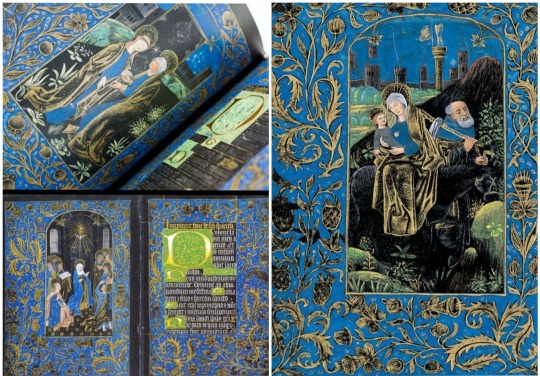
The Black Hours is a book of hours (a type of prayer book) created in Bruges, Belgium.
The style is in imitation of Wilhelm Vrelant, the most popular illuminator of the period and constructed of vellum (calfskin) that’s been dyed pitch black.
Gold and blue paint overlay the dark background to create an almost otherworldly look.
Written in silver and gold ink, the text lists the prayers to be said while depictions of Bible stories aid the reader in meditation.
3. Book of Kells, 9th century
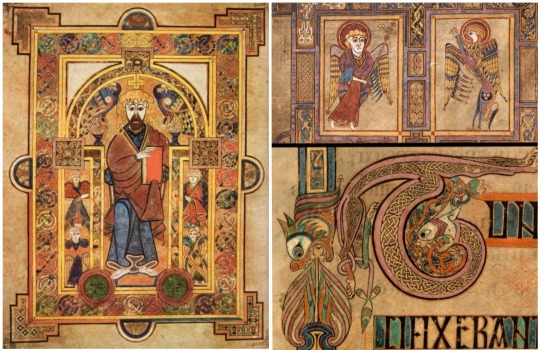
Among the most iconic medieval manuscripts is the Book of Kells.
Created in a Columban monastery, the text is the pinnacle of early medieval calligraphy and illumination.
The graphics are a blend of insular art (the post-Roman era style of art popular in Irish monasteries) and traditional Christian iconography.
Plants, animals, Celtic knots, and biblical figures decorate the 680 page volume to tell the story of Jesus’ life.
4. Codex Argenteus, 6th century
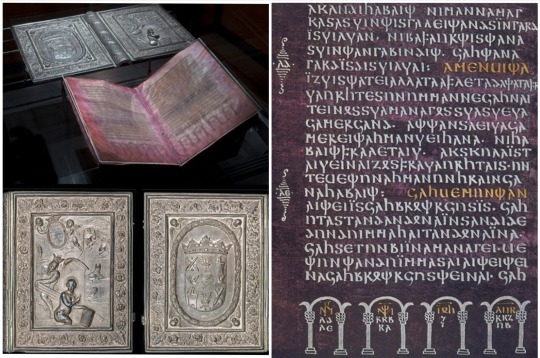
Latin for “Silver Book,” the Codex Argenteus contains the four gospels written in Gothic, making it one of the world’s foremost sources for the now-extinct language.
The book was likely written as a gift for Ostrogothic king, Theodoric the Great.
The work is particularly striking due to its purple-stained vellum pages, metallic ink, and silver binding. Looks almost Tolkienesque…
5. Acre Bible, 13th Century

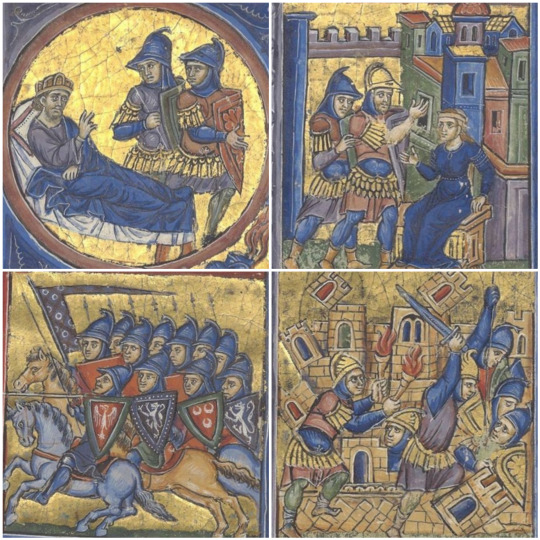
Another work commissioned by Louis IX, the Acre Bible was compiled shortly after the king’s release from captivity during the disastrous 7th crusade.
Upon returning to France, he deposited the masterwork in his newly built Sainte-Chapelle library.
It contains 19 books of the Old Testament, and its illustrations are considered masterpieces of crusader art.
6. The Aberdeen Bestiary, 12-13th century

A bestiary is essentially an encyclopedia of animals and mythical beasts.
They gained popularity throughout the Middle Ages as readers could learn about exotic animals or mythical creatures.
This one was owned by Henry VIII and features a retelling of the Genesis creation story with fantastical images of creatures both real and imagined.
7. The Very Rich Hours of the Duke of Berry, 15th century
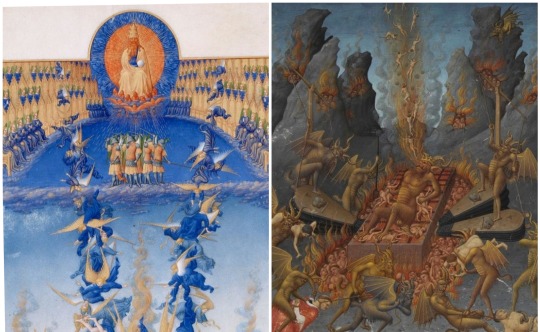
The best surviving example of the International Gothic style of illumination, it’s one of the most lavishly designed late-medieval manuscripts and contains well over 100 illustrations.
Despite beautiful scenes covering most of its pages, the work didn’t shy away from darker imagery.
8. The Berthold Sacramentary, 13th century

Commissioned by the abbot of Weingarten Abbey, this manuscript is a form of missal called a sacramentary used by priests for liturgical services.
A sacramentary gives the priest's readings and prayers for the Mass. This one is a paragon of Romanesque art.
#illuminated manuscripts#medieval manuscripts#medieval illumination#Middle Ages#medieval period#art history#books#handmade books#scribe#illuminator#The Morgan Crusader Bible#The Black Hours#Book of Kells#Codex Argenteus#Acre Bible#The Aberdeen Bestiary#The Very Rich Hours of the Duke of Berry#The Berthold Sacramentary#Wilhelm Vrelant#King Louis IX#medieval calligraphy#Theodoric the Great#bestiary#Henry VIII#Weingarten Abbey#sacramentary#missal
8 notes
·
View notes
Note
hiya, can I ask you what's your... uhm method for reading the bible? growing up I never had contact w it, I'm really excited to read it buuut it can be a very cryptic reading lmao
did you use a backing source (literary guide books, theological, etc) to help your reading, or do you have any references you'd indicate? any tips to share w the classroom lol
thanks ~~ <3
hii thank you for this ask i honestly love talking about this lol. i think a lot depends on your reasoning behind reading the bible, it's such a vast and massively influential piece of literature that it's impossible to decide on one "correct" approach to reading it.
i recommend you buy/borrow a study bible, aka one with annotations done by people who aren't looking at it through a purely religious lense, it's good to have one with maps, commentaries, graphs etc. (you can find this sort of stuff online as well). i have two copies, one catholic for the new testament and a Jewish Study Bible (a great resource if you can find it).
as for approach/reading plan there are many, i just tend to read the books in order (remembering different religious denominations have differing canons so the book of judith for example is not found in certain bibles), i'd say the one thing to remember is that the books themselves are cohesive works, you shouldn't just pick a chapter at random because you're not gonna understand much and always read an introduction to a book before starting it (like what time it was written, historical context, potential authorship etc.). i'd say to start with the hebrew bible (aka the old testament) or at least the five books of moses because the new testament is set very specifically in that context, like jesus is not just some guy that popped out of nowhere lol.
an AMAZING resource that can guide you in your reading are these two open yale courses one on the hebrew bible and one on the new testament. i also tend to look things up on biblehub when i read, they have different translations and commentaries available for each verse. honestly google is your best friend here like of course be wary of like weird creationist websites that are gonna convince you this is all historical records written by one guy (a lot of them will pop up lol) but in general there is just so much historical context and nuances behind the bible, you gotta search things and patiently learn and i promise it will become much less "cryptic"
3 notes
·
View notes
Text
The Books of the Bible: Old Testament (1 of 2) The Books of the Bible in order with introductions and summaries for the Old Testament.

The Five Books of the Law: Genesis, Exodus, Leviticus, Numbers, and Deuteronomy
Genesis The Book of Genesis is the first book of the Christian Old Testament. Genesis speaks of beginnings and is foundational to the understanding of the rest of the Bible. It is supremely a book that speaks about relationships, highlighting those between God and his creation, between God and humankind, and between human beings.
Exodus The Book of Exodus is the second book of the Christian Old Testament. Exodus describes the history of the Israelites leaving Egypt after slavery. The book lays a foundational theology in which God reveals his name, his attributes, his redemption, his law and how he is to be worshiped.
Leviticus The Book of Leviticus is the third book of the Christian Old Testament. Leviticus receives its name from the Septuagint (the pre-Christian Greek translation of the Old Testament) and means "concerning the Levites" (the priests of Israel). It serves as a manual of regulations enabling the holy King to set up his earthly throne among the people of his kingdom. It explains how they are to be his holy people and to worship him in a holy manner.
Numbers The Book of Numbers is the fourth book of the Christian Old Testament. Numbers relates the story of Israel's journey from Mount Sinai to the plains of Moab on the border of Canaan. The book tells of the murmuring and rebellion of God's people and of their subsequent judgment.
Deuteronomy The Book of Deuteronomy is the fifth book of the Christian Old Testament. Deuteronomy ("repetition of the Law") serves as a reminder to God's people about His covenant. The book is a "pause" before Joshua's conquest begins and a reminder of what God required.
Historical Books: Joshua, Judges, Ruth, 1 and 2 Samuel, 1 and 2 Kings, and 1 and 2 Chronicles
Joshua Joshua is a story of conquest and fulfillment for the people of God. After many years of slavery in Egypt and 40 years in the desert, the Israelites were finally allowed to enter the land promised to their fathers.
Judges The book of Judges depicts the life of Israel in the Promised Land—from the death of Joshua to the rise of the monarchy. It tells of urgent appeals to God in times of crisis and apostasy, moving the Lord to raise up leaders (judges) through whom He throws off foreign oppressors and restores the land to peace.
Ruth The book of Ruth has been called one of the best examples of short narrative ever written. It presents an account of the remnant of true faith and piety in the period of the judges through the fall and restoration of Naomi and her daughter-in-law Ruth (an ancestor of King David and Jesus).
1 Samuel Samuel relates God's establishment of a political system in Israel headed by a human king. Through Samuel's life, we see the rise of the monarchy and the tragedy of its first king, Saul.
2 Samuel After the failure of King Saul, 2 Samuel depicts David as a true (though imperfect) representative of the ideal theocratic king. Under David's rule the Lord caused the nation to prosper, to defeat its enemies, and to realize the fulfillment of His promises.
1 Kings 1 Kings continues the account of the monarchy in Israel and God's involvement through the prophets. After David, his son Solomon ascends the throne of a united kingdom, but this unity only lasts during his reign. The book explores how each subsequent king in Israel and Judah answers God's call—or, as often happens, fails to listen.
2 Kings 2 Kings carries the historical account of Judah and Israel forward. The kings of each nation are judged in light of their obedience to the covenant with God. Ultimately, the people of both nations are exiled for disobedience.
1 Chronicles Just as the author of Kings had organized and interpreted Israel's history to address the needs of the exiled community, so the writer of 1 Chronicles wrote for the restored community another history.
2 Chronicles 2 Chronicles continues the account of Israel's history with an eye for restoration of those who had returned from exile.
Books of Poetry and Songs: Esther, Ezra, and Nehemiah
Ezra The book of Ezra relates how God's covenant people were restored from Babylonian exile to the covenant land as a theocratic (kingdom of God) community even while continuing under foreign rule.
Nehemiah Closely related to the book of Ezra, Nehemiah chronicles the return of this "cupbearer to the king" and the challenges he and the other Israelites face in their restored homeland.
Esther Esther records the institution of the annual festival of Purim through the historical account of Esther, a Jewish girl who becomes queen of Persia and saves her people from destruction.
8 notes
·
View notes
Text
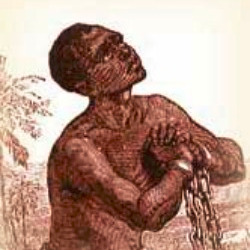
received an email yesterday concerning an article I wrote some time ago. The person asked me so many interesting and thought-provoking questions in that email. In this follow-up post, I will try to answer some of those questions to the best of my knowledge.
What role did the church play in the Trans-Atlantic Slave Trade? What exactly does the Bible say about slavery? Is Christianity a “slave religion”? Why so many black people love the church and the Bible?
According to Jomo Kenyatta, the founding father and first president of Kenya, “When the missionaries arrived, the Africans had the land and the missionaries had the Bible. They taught us how to pray with our eyes closed. When we opened them, they had the land and we had the Bible”.
That was the beginning of the European colonization of Africa. As I said in my other post, the Trans-Atlantic Slave Trade was introduced by the coming of the Europeans. The Europeans came with the Bible the same way the Arab raiders and traders from the Middle East and North Africa introduced Islam and the Quran through the Trans-Saharan Slave Trade. So yes, the church did play a major role in the Trans-Atlantic Slave Trade. In fact, the church was the backbone of the slave trade.
In other words, most of the slave traders and slave ship captains were very “good” Christians. For example, Sir John Hawkins, the first slave ship captain to bring African slaves to the Americas, was a religious gentleman who insisted that his crew “serve God daily” and “love another”. His ship, ironically called “the good ship Jesus,” left the shores of his native England for Africa in October 1562.
The church, especially the Roman Catholic and the Anglican Churches, had plantations with slaves working on them. For example, the United Society for the Propagation of the Gospel (USPG) – the world's oldest Anglican mission agency, owned several acres of slave plantations. It has been documented that the 800 acre Codrington slave plantation in Barbados was owned and operated by the United Society for the Propagation of the Gospel (USPG) during the 18th and 19th centuries.
One may ask, why would the church condone such barbaric acts as slavery? Well, the answer lies in the Bible the same way the answer for extremist Islamic terrorism in the world today lies in the Quran. Yes, slavery isn't just "normal" in the Bible. It is perfectly OK (or can be interpreted so) according to the scriptures. There are several chapters and verses supporting slavery in both the old and new testaments of the Bible.
Exodus 21 of the old testament of the Bible for example, gives clear instructions on how to treat a slave. Both Deuteronomy 20:10-14 and Leviticus 25:44-46 also give clear instructions on who should be slaves, how and where to buy slaves, etc.
Some Christians argue those chapters and verses are in the old testament and therefore don’t count but that is heresy. Also, there are several chapters and verses supporting slavery even in the New testament of the Bible. For example, the book of Ephesians 6:5 of the New Testament clearly states “Slaves, Obey your earthly masters with deep respect and fear. Serve them sincerely as you would serve Christ”. Not just that, 1 Timothy 6:1 of the New Testament also clearly states “Christians who are slaves should give their masters full respect so that the name of God and his teaching will not be shamed”. I can go on and on.
Slavery existed during the time of Jesus and continued after Jesus. Slavery got abolished nearly 2000 years after the death of Jesus. Jesus had every chance to speak against slavery. The question is, did he do it? And if Jesus did speak against slavery then why did his followers twist his words? If Jesus did speak against slavery then why does the New Testament of the Bible support slavery? And if the Bible got twisted along the way then does it make much sense for us to put our trust in it?
Now back to the question, "Is Christianity a slave religion?" Well, I am not that great with the Bible so I will leave that to the experts to answer.
Reverend Richard Furman, President of the South Carolina Baptist convention 1823 said, “The right of holding slaves is clearly established in the holy scriptures, both by precepts and by example”.
In a letter to the Emancipator in 1839, the Reverend Thomas Witherspoon of the Presbyterian church of Alabama in the USA wrote, “I draw my warrant from the scriptures of the old and new testaments to hold the slave in bondage”.
"The extracts from Holy Writ unequivocally assert the right of property in slaves"--Rev. E.D. Simms, professor, Randolph-Macon College. I can go on and on.
So as we can see, the church and the early Christians saw nothing wrong with slavery and fully engaged themselves. Most churches and cathedrals owned several acres of slave plantations and owned several slaves. Even when slavery was abolished, most churches had to be compensated for setting their slaves free.
Yes, one of the ironies of the 1833 Slavery Abolition Act was that, it was slave owners, not the slaves, who were compensated at the emancipation of slaves. The Anglican Church received 8,823 pound sterling in compensation for its loss of over 400 slaves. The Bishop of Exeter, along with three of his colleagues received some 13,000 pounds in compensation for over 660 slaves. All these have been documented and I can go on and on.
Why so many black people love the church and the Bible? Well, that is a question I cannot answer all alone.
#Christianity and Slavery: The role of the Church#slavery#church#catholic church#anglican church#christians#slavery in america
19 notes
·
View notes
Text
Her Sisters and Brother
Liz and Grace Georgia, United States
In 2010, I began my own healing journey for my abortions when my only living child, my daughter Grace, was 11 years old. As she was growing up, I cannot tell you how many times she would ask me, “Mama, are you ever going to have any more children?” Or, “Mom, I wish I had a sister or a brother. I wish I wasn’t the only child.” And each time I heard my daughter say these things to me, my heart would break, for I was harboring the painful secret and the deep shame, regret, and remorse of my abortions. Finally, I couldn’t stand it any longer and began my own healing journey. I attended the Rachel’s Vineyard Retreat and then participated in a post-abortion healing Bible Study.
After experiencing God’s healing, I became a pro-life advocate and activist and began working for PATH, Post Abortion Treatment & Healing, in Atlanta. I knew at some point I was going to have to tell Grace the truth about her siblings lost to abortion, but I didn’t know when. I prayed for the Holy Spirit to begin preparing both of us and to let me know when the right time would be for Grace to hear the painful, shocking truth—that she had two sisters and one brother in Heaven.
On Mother’s Day 2016, after the family’s festivities were over, Grace and I were alone in the family room, and I truly felt the Holy Spirit prompting me to tell Grace about my abortions. Grace was 17 years old and a junior in high school. I talked to her about the story of Saul and what kind of person he was before he started living for God. He was not a very good person; he killed and persecuted many innocent people before having an overwhelming conversion experience and becoming one of the best apostles of Jesus who ever lived. What a powerful testament of how powerful Jesus’s healing and forgiveness is! Grace knew I worked for PATH – that we minister to women and men who have been negatively affected from their abortion experience. I asked her if she thought I was using book knowledge or experience as I ministered to these people in PATH. She just stared at me and looked away with unbelief, shock, and horror. She asked me, “Mom, did you have an abortion?” I answered her, “Yes, I did.” Tears began rolling down her cheeks. My heart was breaking, but I was also feeling the conviction of the Holy Spirit to tell her the WHOLE truth—that I had had three abortions, not just one. So I told her the WHOLE truth and told her of my deep regret, sadness, and sorrow for what I had done. Yet, just like God forgave Paul, God forgave me! And, as a result of this overwhelming forgiveness and mercy, I wanted to help lead others to God’s healing, too. I told her I didn’t want to keep family secrets. Additionally, I NEVER wanted her to ever have to go through what I had experienced, but I did want her to know the TRUTH about abortion and its aftermath.
I told her that she may begin to feel and experience many different emotions now that she knows the truth about my abortions, such as sadness, fear, anger, survivor’s guilt, among many other feelings. I offered her people from PATH she could talk to that would understand if she ever needed to talk about it.
The following January (2017), when Grace was a senior in high school, she and I marched together for the first time at the March for Life in Washington, D.C. As we marched, Grace boldly carried a sign that said, “I Mourn the Loss of my Aborted Sibling”, and I carried my sign that said, “I Regret My Abortion.” And she was there when I shared my post-abortion healing testimony for Silent No More at the United States Supreme Court. It was a powerful day for us both.
During summer 2017, Grace had just graduated high school and was going away to college in the fall. As a family, we went up to Chattanooga, TN and had a memorial Mass for our three babies in Heaven and then went to the National Memorial for the Unborn to honor these babies. We had a brass name plate made for each one of them with their names and a special message on it. Then Grace placed each name plate on the Wall of Names. This was a very special day.
“I’ve been through a lot of pain and stuff and I just wonder what it would have been like if they were here to help me through it,” says Grace. The shockwaves of abortion run deep. In October 2018, Grace continued her healing journey by attending the Rachel’s Vineyard Retreat, where she was able to grieve the loss of her siblings in Heaven. Grace is a sophomore in college now and has encountered many opportunities to defend LIFE. She says she “will always fight for her siblings and be a voice for them.” She has become quite the pro-life advocate and activist and has even debated in class about the devastation and shockwaves of abortion, admitting her own experience with being the sibling of three children lost to abortion. She has also expressed an interest with getting involved with Students for Life Ministry on her college campus. I am so proud of her, and I know her two sisters and brother in heaven are proud of her too!
Find more testimonies at Silent No More
7 notes
·
View notes